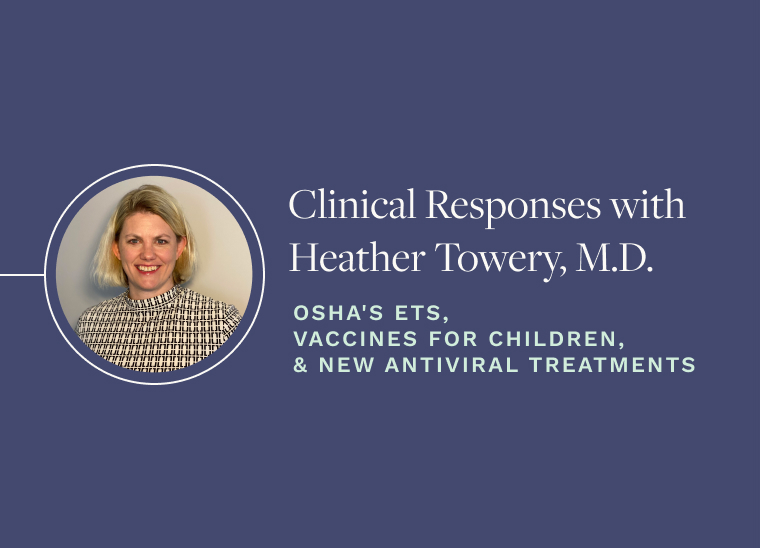Stay up-to-date on the most recent news about COVID-19 to help inform your workplace decisions. Below, you’ll find an analysis of:
- OSHA’s Emergency Temporary Standard (ETS)
- Vaccine eligibility for children
- Pfizer’s antiviral drug for treatment of COVID-19
Also, as a reminder, we are now in the midst of cold and flu season. While your employees are scheduling their vaccinations or booster shots, they should also be scheduling their flu shots. If your employees meet the age and other eligibility requirements, they should also schedule their pneumonia and shingles vaccines.
OSHA’S EMERGENCY TEMPORARY STANDARD (ETS) ON COVID-19
On November 5, OSHA’s ETS on COVID-19 was entered into the Federal Register. Employers have 30 days from November 5 to complete all of the ETS requirements (e.g., developing a policy, determining and recording employee vaccination status, reporting, etc.) and 60 days to ensure all employees who are unvaccinated are tested weekly. The ETS is enforceable for 6 months and can be renewed.
The ETS applies to employers with 100 or more employees and preempts state and local laws regarding workplace requirements related to vaccine mandates, testing, and face coverings. Employees who work remotely full-time, who do not report to a workplace where other workers are present, and employees who work outdoors full-time are exempt from the ETS.
Employers have until January 4, 2022, to ensure employees have completed their initial COVID-19 vaccine series or require unvaccinated employees to test negative for COVID-19 at least one time per week. Employer fines for not complying with the ETS are $13,000 per violation or $136,000 per willful violation.
Under the ETS, employers must provide employees with reasonable paid time off to receive the vaccine (up to 4 hours for each vaccine dose) and reasonable time and paid sick leave to recover from any side effects experienced after receiving the vaccine. The ETS requires employers to record and maintain a physical or digital copy of each employee’s vaccination record.
For unvaccinated employees, the ETS requires employers to test for COVID -19 at least once per week. The employer is not required to pay for the cost of testing unless governed by another statute or collective bargaining agreement. Unvaccinated employees must also wear a face covering in the workplace when indoors or when riding in a vehicle with another person for work purposes.
You can get more details on OSHA’s ETS here.
PFIZER BIONTECH VACCINE FOR CHILDREN
On November 2, the CDC issued formal recommendations for children aged 5 to 11 years old to be vaccinated against COVID-19 with the Pfizer-BioNTech vaccine. For children, the vaccine dosage is one-third of that for adults and is administered as a two-dose series. It has been shown to be 90.7% effective in preventing COVID-19 in children. Pharmacies, doctors’ offices, and schools are all participating in the distribution.
Recently, the FDA informed Moderna that it will require more time to evaluate data before it can consider authorizing their vaccine’s usage in children. The review may not be completed before January of 2022.
PFIZER’S ANTIVIRAL DRUG TREATMENT FOR COVID-19
Pfizer has followed Merck with its announcement regarding a pill to treat COVID-19. In a clinical trial, the Pfizer antiviral drug, Paxlovid, was shown to be highly effective at preventing severe illness among at-risk people who received the drug soon after they exhibited symptoms. Those who took the antiviral treatment within three days after the start of COVID-19 symptoms were found to have an 89% reduced risk of hospitalization or death. Encouraged by the results, Pfizer stopped their trial early and plans to submit data to the Food and Drug Administration as soon as possible in order to seek authorization for the pill to be used.
Authored by Heather Towery, M.D., VP Clinical Strategy and Enterprise Partnerships at Eden Health
Disclaimer: This information is based on current resources available and is subject to change. This document and its contents are provided for informational purposes only, and not intended to be, and should not be understood or treated as, a substitute for professional medical advice around COVID-19, its risks or symptoms, or to take the place of any local, state and national laws and guidelines around COVID-19. Always seek the advice of a physician or other qualified health provider with any questions you may have regarding a medical condition.





